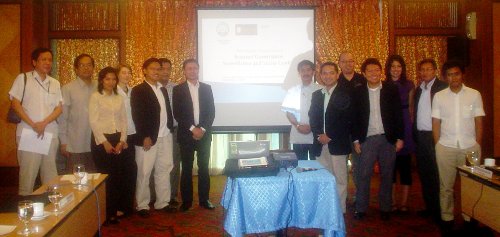Discussing Internet Surveillance And Social Controls

After the courtesy call and oath-taking with CICT on September 1, 2009, I-Café Pilipinas immediately started its advocacy campaign for the Internet café industry and joined the round table discussion about Internet Governance, Surveillance and Social Controls aimed to consider the changing architecture of the Internet and the types of governance, policies, technologies, practices and social controls that are being employed to regulate and filter citizen access on sites in the Internet. The discussion was organized by La Salle Institute of Governance (LSIG) and held last September 3, 2009 at the College of St. Benilde International Hotel in Malate, Manila.
The round table discussion was attended by representatives of mainstream media (NUJP and Inquirer.net), government agencies (DWSD, DOJ and Senate), Internet advocacy group (Philippine Internet Commerce Society and I-Café Plipinas) and the academe (LSIG). Most of the discussions centered on the Senate and House bills which had passed third readings by both chamber and will soon become the Anti-Child Pornography Act. Senate Bill No. 2317 and House Bill No. 6440 became the subjects of discussion after I-Café Pilipinas representatives mentioned about their provisions mandating the Internet Service Providers (ISPs) to install available technology, program or software to ensure that access to or transmittal of child pornography will be blocked or filtered.
The group discussed thoroughly why such provision in a law concerning a very sensitive social issue could lead to intrusion to one’s privacy if not properly implemented by the governing body authorized by the soon-to-become law. I-Café Pilipinas representatives emphasized their position wherein the industry is in support of having stricter measures against child pornography but not the provision authorizing ISPs to filter the web at their level. Aside from Internet surveillance that the ISPs and the authorities can conduct on anybody, network degradation of the already poor quality of service of ISPs is inevitable.
Again, my often-mentioned examples of China’s recent decision to hold the implementation of its Green Dam Youth Escort project that provides filtering only on end-user’s side and Malaysia’s move to adopt similar scheme has faced serious opposition from various sectors was brought up in the discussion. When asked by the group what access control would the Internet café industry agree to, the I-Café Pilipinas representatives informed the body that blocking pornographic (both child and adult) sites are already being done in most cafés either in compliance with local ordinance or as a social responsibility of the owner.
With its participation in the discussion described above, I-Café Pilipinas has now gone out of its shell in an effort to build a better image for the Internet café industry in the country. The issue of online gaming as part of social controls in the access to the Internet was also touched in the discussions. I will write about this in my coming blogs. Watch for it!




Hello EdZee
Thank you for the info regarding PR sched of update this month..Have wonderful day to you..Was here to visit you..
.-= vicy´s last blog ..Longing for a Page Rank =-.